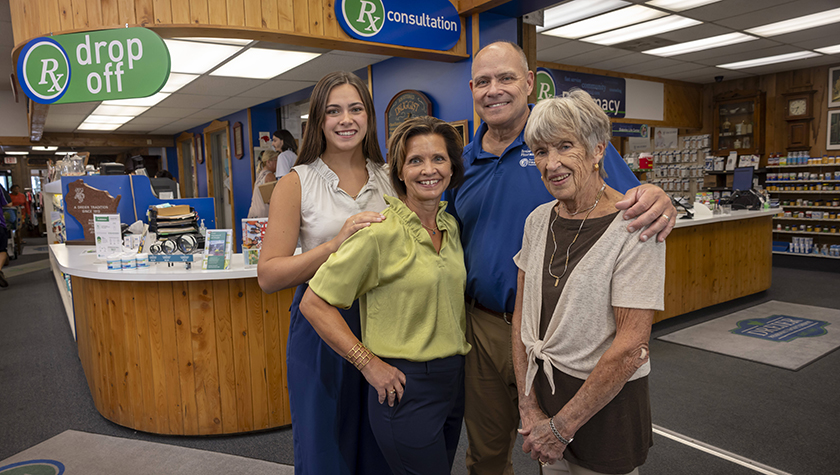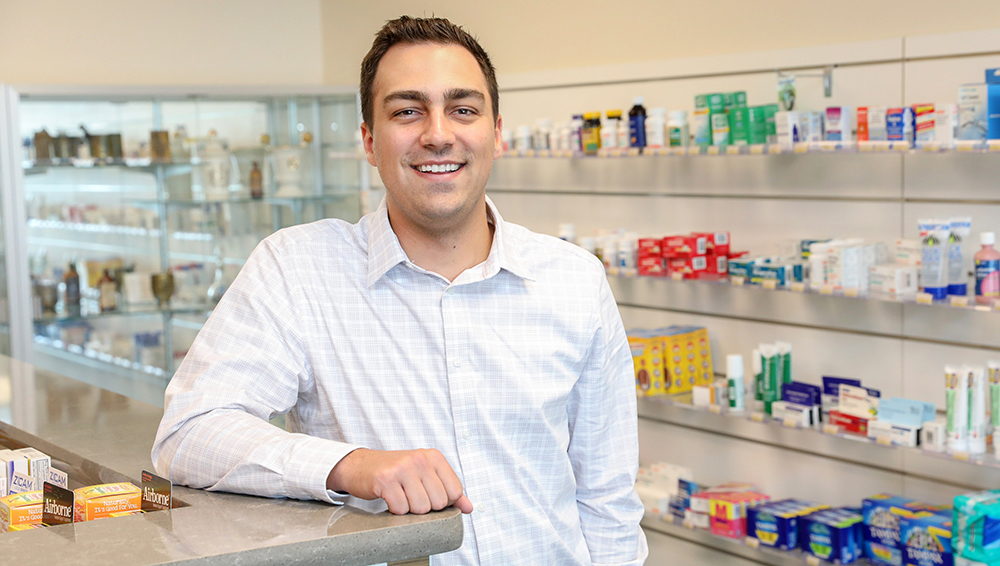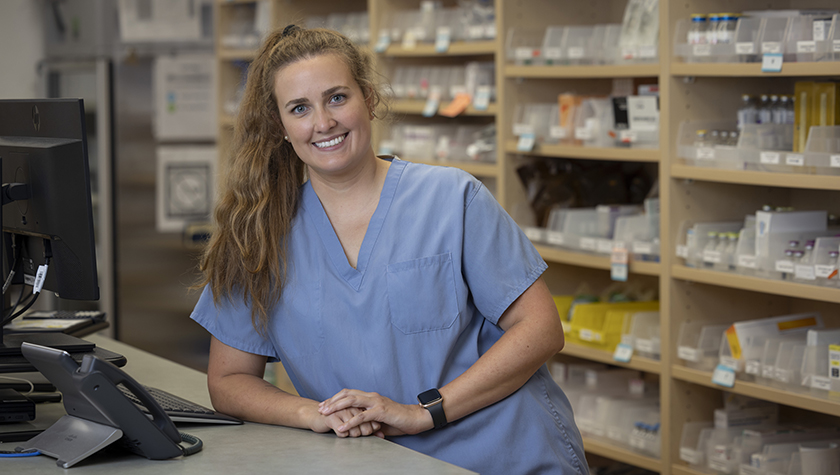
Early graduates of the School’s Rural Health option in the PharmD program are making an impact on their communities
By Katie Ginder-Vogel
Briggsville, on the shore of Mason Lake in south central Wisconsin, has a population of just 300 people. One of those people was Lindsey Hoff (PharmD ’19). Growing up in this small rural town, Hoff and her family had to travel to Wisconsin Dells or Portage to find healthcare.
“I was always interested in rural health and have a passion for it, having grown up in that environment,” Hoff says.
Her first stop on this journey was the University of Wisconsin–Madison School of Pharmacy. As a student at the School, Hoff helped to pave a new path for other student pharmacists: the Rural Health option in the PharmD program. The curriculum positions students to serve as healthcare leaders, innovate, and learn from rural community members during their schooling.
“We focused on a specific city, identified a health need, designed a way to address it, and reported on what we did and what we saw,” Hoff says. “That’s still a major piece of the program, as is having a mentor to walk you through ideas and teach you skills you can use in the future.”
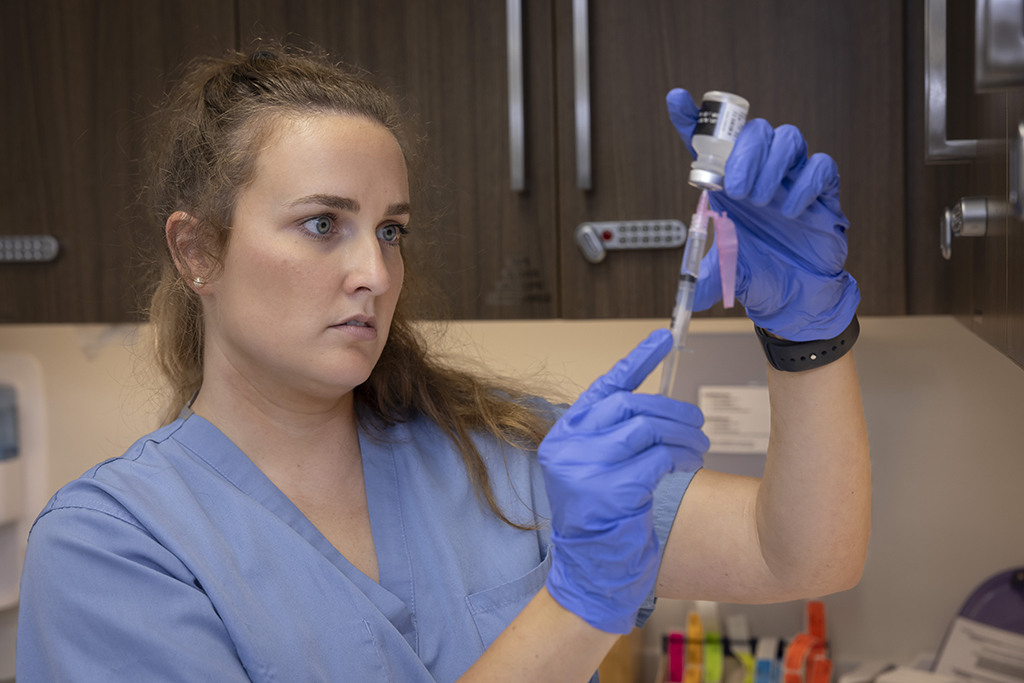
She worked with Ed Portillo (PharmD ’14), associate professor of pharmacy practice, and others to help create courses that would teach pharmacy students the unique skills they need to thrive in rural areas and provide a higher level of innovative care.
“We built the Rural Health program with the Wisconsin Idea at the forefront,” says Portillo, who continues to lead the program with Professor Dave Mott (BS ’88, MS ’92, PhD ’95) and Associate Professor Kevin Look (PharmD ’09, MS ’11, PhD ’13) of the School’s Social and Administrative Sciences Division, and Professor Casey Gallimore (PharmD ’05, MS ’13) , Professor Beth Martin (BS ’90, MS ’03, PhD ’06), and Professor Barry Gidal of the School’s Pharmacy Practice and Translational Research Division. “The idea is that our graduates will partner with and learn from rural patients, be a part of that community, and then contribute to that community as innovative healthcare leaders. And that’s exactly what they’ve done.”
Hoff, Anna Lattos (PharmD ’21), and Morgan Platta (PharmD ’21) — all early graduates of the School’s Rural Health courses — have taken their specialized education to rural areas around the region to launch new services to better serve patients.
“The classes were amazing — life changing — and were so important to my life and career,” Lattos says. “The professors at UW care so much about our development and the profession.”
Improving pharmacy safety and efficiency
As she was closely involved in developing Rural Health courses, Hoff picked up the skills necessary for rural pharmacists, who serve as a jack-of-all-trades. Today, she’s a clinical pharmacist at a 25-bed critical access hospital in Ironwood, which is situated in Michigan’s Upper Peninsula along the Wisconsin border. The hospital has three pharmacists who handle infusions and pharmacy services for the emergency, obstetrics, intensive care, and medical-surgical departments around the clock.
“It’s really satisfying,” Hoff says. “I love it, and it’s so nice to use my knowledge from the School to make a huge community impact and provide safer and better healthcare for the community.”
“I love it, and it’s so nice to use my knowledge from the School to make a huge community impact and provide safer and better healthcare for the community.”
—Lindsey Hoff
Hoff has led multiple initiatives to improve care for her rural patients, including a medication reconciliation process to identify potential errors and an antimicrobial stewardship program. She also created an emergency pharmacy kit to make her responses to emergency code situations more rapid and effective.
“It includes epinephrine syringes, lidocaine, bicarb syringes, resources, a calculator, and basic materials to quickly whip up IV drips — all my stuff, so I can literally grab it and leave,” she says.
One of her larger projects involved building a sterile compounding program and training pharmacists and technicians, empowering pharmacists to practice at the top of their licenses.
“When I first got here, only pharmacists were doing compounding, and now both pharmacy technicians’ and pharmacists’ eyes are on compounding,” she says. “It’s important to have both sets of eyes on things for safety and efficiency.”
Getting ‘meds to beds’
Lattos’ career path was inspired by her parents — Marcy (BS ’97) and Scott (BS ’97) Lattos — and her rural Wisconsin hometown. After taking the specialized rural health courses at the School, Lattos completed a combined PGY-1/PGY-2 residency with a master’s degree in health system pharmacy at The Ohio State University Medical Center, choosing to develop her leadership and administrative skillset at an academic medical center to learn as much as possible to elevate the care in rural communities, where she planned to eventually work.
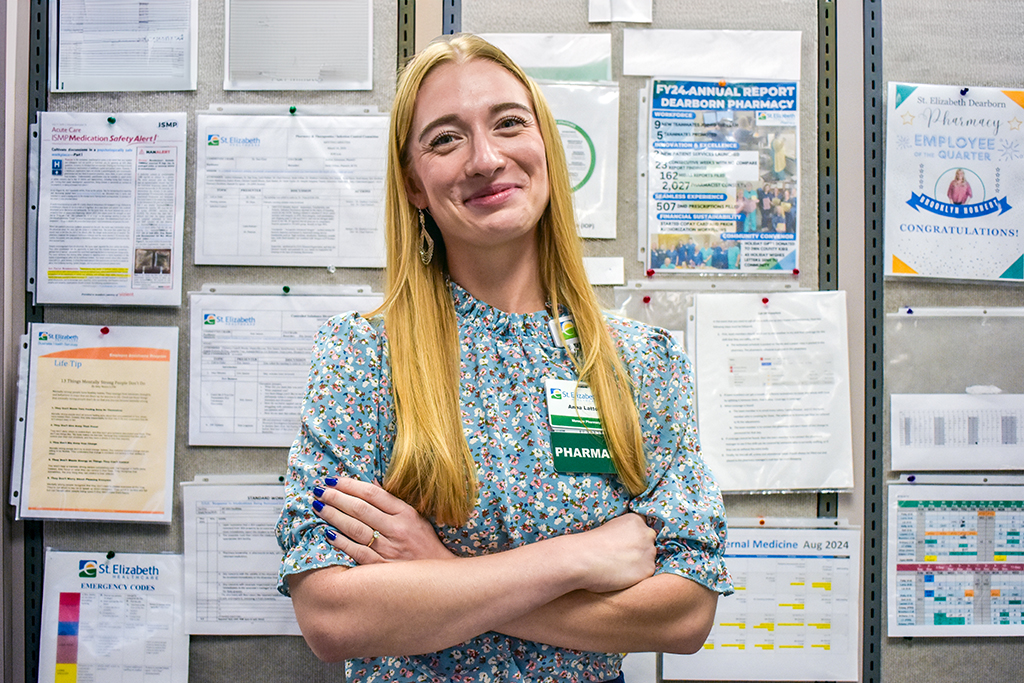
Her current role — manager of pharmacy services at St. Elizabeth Healthcare Dearborn in rural Indiana — includes managing inpatient and outpatient pharmacy services, which gave her an opportunity to facilitate transitions of care. Since joining the hospital last year, she has helped expand pharmacy services on-site to 24 hours, focused on pharmacy technician advancement to improve retention, and helped initiate a medication safety committee.
One of her larger initiatives has been launching a “meds to beds” program, where patients get their medications delivered to their bedsides before they leave the hospital, and positioning pharmacists to lead the discharge counseling process.
“I learned how to manage these projects and teams through the Rural Health program and my residency training,” she says. “The Rural Health class motivated me, as did my training and my mentors, who encouraged me to push myself and continue to learn, grow, and expand my network.”
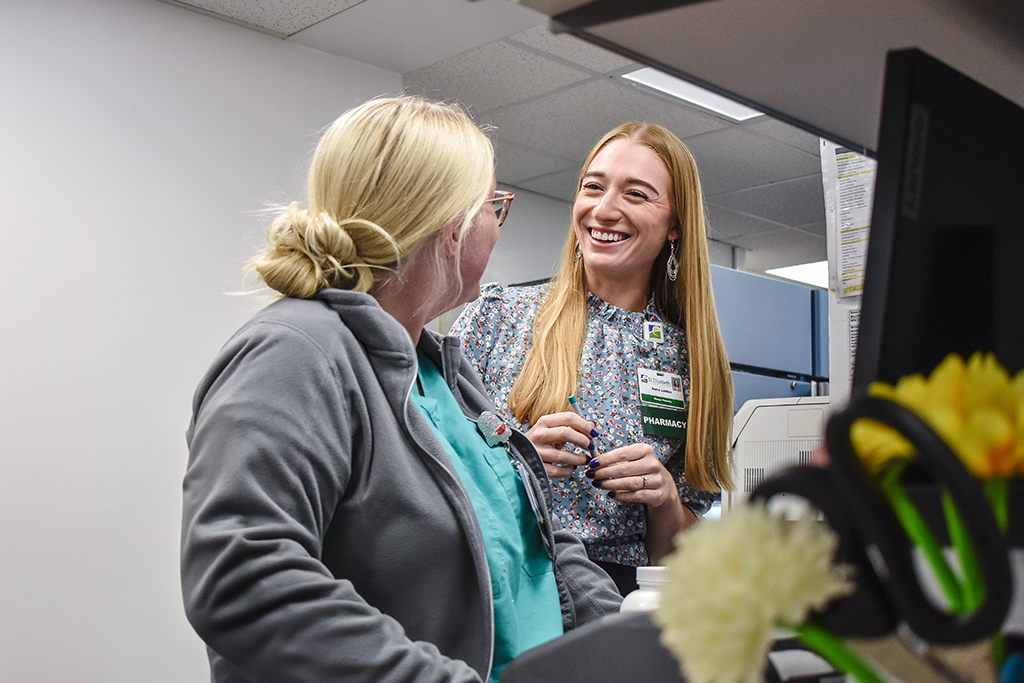
Lattos says her training taught her the value of interprofessional collaboration and relationship-building. When she joined St. Elizabeth’s, one of her first priorities was meeting with the chief nursing officer to better understand the facility’s needs.
“Everyone brings a different perspective and a unique set of strengths,” she says. “I love surrounding myself with people who have different realms of expertise.”
Lattos credits the Rural Health program’s emphasis on diving into projects and learning by doing with the way she manages.
“They gave us the tools and mentors to succeed, and through the process of just diving in, we learned about our own strengths and weaknesses, and now I do that with the St. Elizabeth team,” she says.
Improving ambulatory pharmacy care
As a PharmD student at the School, Platta joined a research group alongside Portillo, Associate Professor Kevin Look, and other PharmD students to map out access to Wisconsin’s community pharmacies, in partnership with the Wisconsin Office of Rural Health. That work was published in the Journal of the American Pharmacist Association in 2021.
“We learned that 99.7 percent of Wisconsinites live within 30 minutes of a pharmacy, which was an ‘a-ha’ moment for me, to know that pharmacists are so readily available in the community,” she says. “We really can do a lot in community settings.”
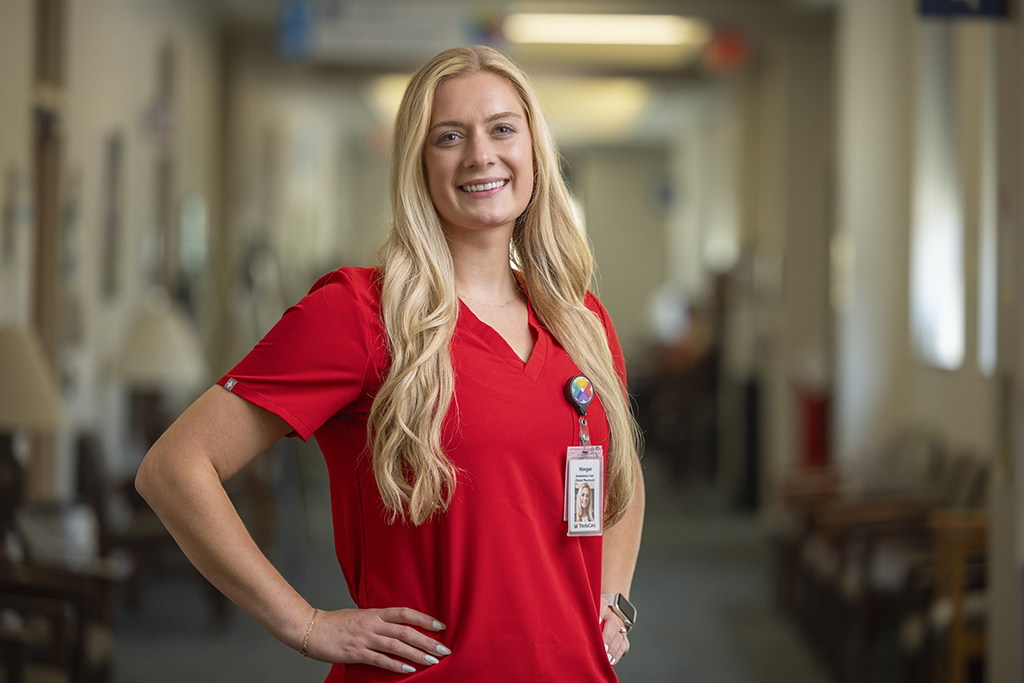
Platta, who grew up on a hobby farm in rural Waupaca County, is now an ambulatory care pharmacist with ThedaCare and focuses on primary care family medicine.
“Most of my day is one-on-one with patients in exam rooms, similar to a physician,” she says. “It’s within my scope to order labs, start and stop meds, and place referrals to other pertinent places, such as diabetes education.”
In addition to chronic disease management, Platta does medication reviews, helping patients organize their medication and improve adherence. She helps patients taper off opioids and benzodiazepines — which help treat conditions like anxiety and muscle spasms — setting up frequent visits to adjust patients’ doses comfortably to reach their goals. She also helps them navigate programs that help with medication affordability.
When she joined ThedaCare, their ambulatory pharmacy program was in its first year and she joined a team of new pharmacists. And as the only pharmacist at her clinic now, Platta frequently relies on her rural health training in interprofessional communication and pioneering services and programs.
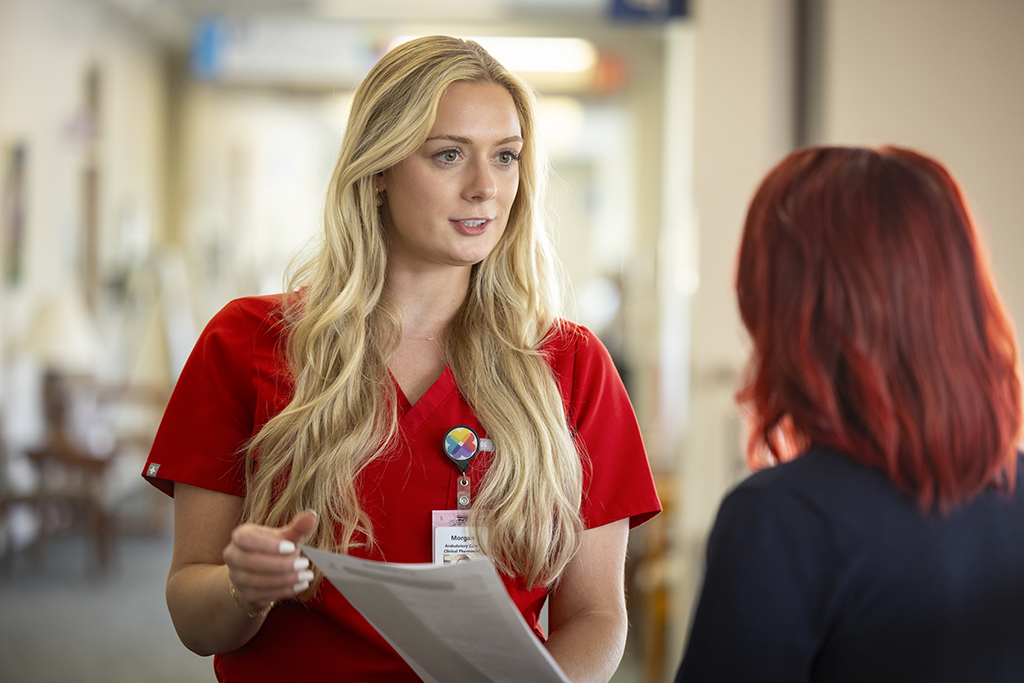
“When I started, I was fresh out of school, working in a brand-new program, and I needed to use my skills for ideas to get more patients in to see me while we’re establishing this program and come up with creative ways to have more engagement with providers,” she says. “Ambulatory pharmacy is a pretty top-of-the-license role, and I was able to graduate from UW–Madison and go straight into this role, with on-the-job training and mentorship, and succeed.”
Platta and her peers joke that people who practice in rural communities are lifers because they get so connected to their towns.
“People want to stay in their communities,” she says. “I find value and pride in going to the grocery store and seeing a patient or their relative, someone who knows I’m a pharmacist in the community and feels comfortable reaching out to me and asking a question. My goal has always been making Waupaca and the surrounding areas healthier communities. I want to live here and foster public health and community health.”
Continuing the Rural Health Program’s success
Portillo is delighted by the Rural Health option in the PharmD program’s continued success and popularity among students.
“When we first started this program, we didn’t know what the impact of the program might be,” he says. “Our graduates are moving to rural communities and bringing innovation and improved care to so many Wisconsinites.”
Hoff, too, is gratified that the program’s popularity continues to surge.
“It’s such a need in our state, and I’m proud of the fact that it’s still going and that there are still people interested and motivated to continue it,” she says.
“Our graduates are moving to rural communities and bringing innovation and improved care to so many Wisconsinites.”
—Ed Portillo
The Rural Health program was built based on feedback and insights from alumni practicing in rural areas, and it’s evolving based on the same. Recently, the program added a new feature: rural alumni mentorship. Aside from serving as preceptors during special rural clinical rotations, graduates of the Rural Health option in the PharmD program — like Hoff, Lattos, and Platta — connect with current students to answer students’ career development questions to help them reach their goals.
“When these students cross the graduation stage, they’re joining our alumni network, and in doing so they are not leaving our program,” says Portillo. “They stay heavily engaged, and they make the program so impactful.”
For example, Platta is presenting to students this fall and is looking forward to drawing more Badgers to rural pharmacy roles.
“We need more people in rural communities doing healthcare work,” Platta says. “I’m passionate about guiding and mentoring the next generation, so more small communities have someone embedded to serve that community.”
